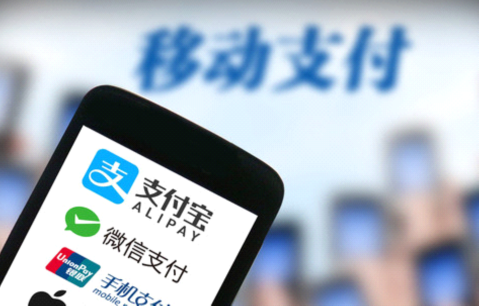By Tom McGregor, CCTV.com Panview commentator and editor
China has long embarked on introducing innovations in science and technology that have set groundbreaking trends on the world stage. But did you know China was the first sovereign nation to print and circulate paper money for its citizens?
Perhaps not, but much of the world remains unaware that Chinese society for many centuries had ushered in remarkable inventions and social systems to make life easier for one and all.
And it's quite possible that the first country to introduce paper money to the world might just become the first nation to go cashless. The Chinese, young and old, are forsaking cash and using smartphones to pay for items at grocery stores and even with street vendors.

(E-payments via smartphones sweep across China Photo from Internet)
Anyone walking the streets of China can see for themselves that customers prefer e-payments over paying in cash when purchasing goods and services.
Looking at the numbers
Most Chinese e-payments consumers are connected to Alipay, launched by Hangzhou-based Alibaba Group in 2004 and now owned by Ant Financial, which claims to have over 520 million users.
Tencent Holdings Co. also provides WeChatPay from the world’s most popular social media site with over 800 million daily users.
According to sales records in China alone, the gross merchandise value (total domestic retail sales) of 3rd-party mobile payments had risen over 200 percent to RMB38 trillion, or US$5.5 trillion, compared to prior year.
That's nearly 50 times higher than the United States, the second highest ranking market, which reported sales figures - US$112 billion.
The United Nations-sponsored Better Than Cash Alliance had issued a report in July 2017 forecasting that China’s paper money payments will only account for 30 percent of all retail sales in the country by 2020.
Celebrate Cashless Week
The Chinese have proven to be the most enthusiastic e-payments consumers. Accordingly, Ant Financial announced plans to organize 'Cashless Cities Week' nationwide on August 1-8, the first week of this month.
All Chinese are encouraged to make only e-payments on smartphones. Five cities - Hangzhou, Wuhan, Tianjin, Fuzhou and Guiyang have pledged to participate with more cites expected to join in.
Making e-payments is simple: You just need a bank account and smartphone. You connect on platforms, either or both - AliPay and WeChat - then you are provided with an individual QR payment code.
Your smartphone allows you to scan other QR codes or your QR code can be scanned for purchases. Let's say, you visit a neighborhood convenience store to buy candy.

(E-payments via smartphones sweep across China Photo from Internet)
You either point the "scan" function of your smartphone at the cashier displaying the shop's QR code with price listed and hit scan to pay, or you show your QR code for the cashier to scan to charge. Your smartphone will tell you when purchase accepted.
WeChat: e-payments champion
The top player for e-payments in China is WeChatPay, since it's free to open and free to use. Whereas, ApplePay and other e-payment platforms charge retailers fees, WeChat does not.
But how does WeChat generate revenues? Every time a user opens up WeChat, they create a digital paper trail. All purchases are stored as Big Data and transmitted on a cloud platform.
Tencent Holdings uses Big Data to analyze consumer trends and sells the reports to major corporations hoping to cash in.
A company selling soap could discover in Big Data reports that the product is more popular in southern China than elsewhere in the country, so they can make adjustments on logistics, marketing and ad campaigns.
Tencent has also partnered up with a German-based e-payments company - Wirecard - to launch its WeChatPay in Europe. They will be challenging AliPay, which is already available in the European Union.
Heading to the USA
The US stands atop as the world's leading economy, many Chinese love to travel to America for shopping excursions.
This year, travel experts are forecasting about 4 million Chinese citizens to visit the US. The Chinese have grown accustomed to making purchases on their smartphones, but many US retail shops have not adapted.
Many American shops allow customers to buy items either with cash or (credit/debit) cards. They offer no e-payments methods for WeChat users or AliPay customers, who are mainly Chinese.
"To meet the needs of Chinese consumers coming to buy in the U.S., it's helpful for retailers and brands to understand the ways that Chinese consumers shop and how their cashless lifestyle at home may impact expectations while they are abroad," Alipay North America President Souhei Bodian, is quoted as saying in Alizalia.com.
E-payments made easy
Major US-based credit card companies - MasterCard and Visa - have agreed to work with China-based UnionPay Co. to expand the QR code transactions' e-payments system reach.
China's mobile e-payments worldwide can flow between banks and credit card companies from places such as a small family-owned toy shop in Lagos, Nigeria to a high-class seafood restaurant in Miami, Florida USA.
When it comes to buying goods and services, going cashless will be the major trend. Not everyone can accept that, particularly the elderly, but your smartphone will become much more valuable when an increasing number of shops stop accepting paper money.
For retailers, cash transactions are not as convenient as e-payments. So even if you prefer to pay in cash in China, it's possible a few years later, this option will cease to exist for shoppers.
(The opinions expressed here do not necessarily reflect the opinions of Panview or CCTV.com)

Panview offers a new window of understanding the world as well as China through the views, opinions, and analysis of experts. We also welcome outside submissions, so feel free to send in your own editorials to "globalopinion@vip.cntv.cn" for consideration.
















